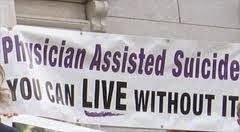Peter Shumlin, the outgoing governor of Vermont, fought hard to legalize assisted suicide in the state; so it was no surprise when he listed it among other “accomplishments” in his farewell speech this week. A big surprise, however, came when the governor revealed that his own father died from assisted suicide. (Link to Youtube video) comments begin at minute 54:50.
Bristling with pride, Shumlin said that never in his wildest dreams did he imagine that his own father would die in this way. In May of 2011, however, True Dignity commented on a speech he made at a VT showing of the film “How to Die in Oregon”. The speech can be viewed at (Link to youtube video) comments begin at Minute 1:40. Speaking about how much he hoped VT would enact legal assisted suicide, he actually used his parents as illustrations of why he felt legalization was important.
Here, in italics are our comments at the time:
Back in 2011, we were sorry for and feared for Peter Shumlin’s parents. It is self-evident to us that any suggestion that suicide is a viable end of life option for another person is itself pressure and can never be anything else If we heard the words Shumlin spoke in 2011 from one of our adult children, we would feel pressured, and we would not forget. No act done under pressure, even the most well-meaning pressure, is ever completely free.
We hope one day to live again in a state in which the sick and elderly are legally protected from such pressure, however well-meaning or inadvertent. Our new governor, Phil Scott, voted against legal assisted suicide when it was passed in 2013. Let’s ask him to work for its repeal now. Contact information will follow in the coming weeks.
Bristling with pride, Shumlin said that never in his wildest dreams did he imagine that his own father would die in this way. In May of 2011, however, True Dignity commented on a speech he made at a VT showing of the film “How to Die in Oregon”. The speech can be viewed at (Link to youtube video) comments begin at Minute 1:40. Speaking about how much he hoped VT would enact legal assisted suicide, he actually used his parents as illustrations of why he felt legalization was important.
Here, in italics are our comments at the time:
We were offended by the governor’s filmed jokes about how his apparently healthy but aged parents haven’t responded as he would have liked to his attempts to have “the conversation” to plan for their dying (in the video the audience laughs when he says he asked where they planned to be in ten years).
… We need….to fight against the seduction of his not so soothing words about how Vermonters “take care of each other”, when he speaks words like these in the context of a conversation about assisted suicide.In 2017 we are even more offended than we were in 2011. It is hard to believe that any governor would brag about facilitating a single suicide in his state. It is even harder to hear that governor brag about facilitating the suicide of his own parent.
Back in 2011, we were sorry for and feared for Peter Shumlin’s parents. It is self-evident to us that any suggestion that suicide is a viable end of life option for another person is itself pressure and can never be anything else If we heard the words Shumlin spoke in 2011 from one of our adult children, we would feel pressured, and we would not forget. No act done under pressure, even the most well-meaning pressure, is ever completely free.
We hope one day to live again in a state in which the sick and elderly are legally protected from such pressure, however well-meaning or inadvertent. Our new governor, Phil Scott, voted against legal assisted suicide when it was passed in 2013. Let’s ask him to work for its repeal now. Contact information will follow in the coming weeks.






































